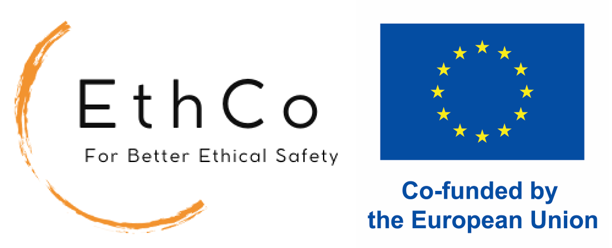Doing a podcast in EthCo

In the digital age, podcasting has emerged as a powerful tool for sharing ideas, stories, and knowledge. Doing the EthCo project’s own podcast was an exciting endeavour. In this blog post, we’ll take you behind the scenes of our podcast development dedicated to the theme of “Ethics in Healthcare – Perspectives to ethics, ethical codes and ethical challenges” and Ethics in Healthcare Environments: from distress to resilience recorded in Finland and Malta.
The initial phase of podcasting involves outlining the concept. Determining the podcast’s focus and identifying the intended audience and crucial aspects. In the case of the EthCo project, our shared passion and expertise revolves around Ethics in healthcare. The podcast was designed for healthcare students, professionals, and to anyone interested in this topic. Furthermore, it will be a part of the educational materials produced within the project.
In the rapidly evolving world of healthcare, ethical considerations are paramount. Decisions made in this sphere have far-reaching consequences, impacting not just individuals but entire communities. In a bid to foster dialogue and the interest of healthcare students and professionals the EthCo-project has embarked on a podcasting journey.
Our goal is to create a three episodes podcast series within the EthCo project, commencing with a foundational episode produced by the Finnish team. The episode introduces the topic of ethics in health care, emphasising its significance and relevance in modern day context. We delve into the role of ethics and professional ethical codes, as guiding principles for healthcare professionals navigating complex decisions- the ethical compass in healthcare. Our guests included (future) professionals in the healthcare field, a nurse with a few years of working experience and a newly qualified paramedic student, accompanied by an experienced healthcare educator, Nina Rantalaiho. The podcast was moderated by Kati Naamanka.
The second episode, also produced in Finland, explores decision-making and the tools available for handling ethical challenges, as well as support available for doing the decisions. The podcast discusses the role of ongoing education and training – how does education prepare professionals to ethical challenges and decision-making. The third episode of our podcast series, produced in Malta invited academics and clinicians to engage in a conversation about ethics, moral distress and ethical decision-making of a day to day basis in healthcare. This podcast looked at current challenges in practical healthcare settings and explored current research in the field of ethics. A special consideration related to nursing and health professions and their development of ethical considerations, when working individually and as an interdisciplinary team.
At the Turku University of Applied Sciences and University of Malta, a professional studio is available for podcasting, including the adequate equipment for good audio quality – microphones, headphones, and audio editing software. These spaces are quiet, sound-proof spaces to minimise background noise. Some of the challenges we faced when producing the podcasts are long pauses, accidental mic movements and adding some music.
Our podcast series on “Ethics in Healthcare” offers a comprehensive exploration of the ethical considerations that permeate the healthcare landscape. By sharing personal stories, expert insights, and diverse perspectives, we aim to spark thoughtful conversations and inspire a deeper understanding of the ethical complexities in healthcare. Ethical decision-making is not a one-size-fits-all approach; it requires continuous dialogue and reflection. We hope that our podcast serves as a valuable resource for healthcare professionals, patients, policymakers, and anyone interested in the ethical dimensions of healthcare. Together, we can navigate the intricate world of healthcare ethics and strive for more ethical and compassionate healthcare practices.
Kati Naamanka, Turku University of Applied Sciences
Adrienne Grech, University of Malta
